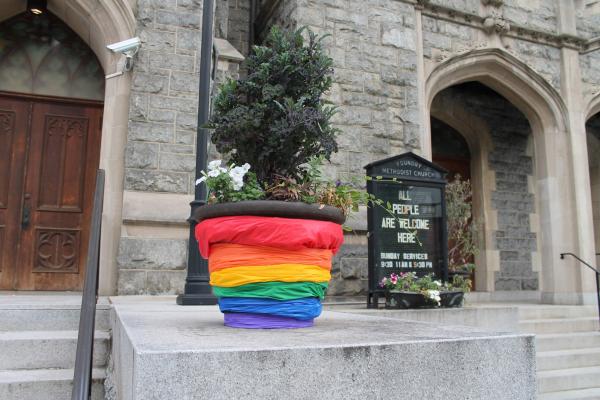One could ask whether taking a vote from 800 delegates from different regions, cultures, and countries, but all part of an increasingly global United Methodist Church, is the best way to discern the will of God or how a denomination should move forward. That’s what former Methodist Bishop Will Willimon wondered to me yesterday, the day after the historic vote to strengthen the church’s “traditional” ban against LGBTQ clergy and marriages. Willimon was disappointed that “once again, the Methodist Church is a mirror of the culture.” The vote showed again how divided the church is, as the vote was nearly split down the middle. That split shows, painfully, that the church is no better place to heal division than anywhere else in our culture.
Willimon, who calls himself Wesleyan Orthodox, told me he finds it “untraditional” to be punitive on sexuality issues, preferring a pastoral approach.
“I think that God’s way is to handle it around the table in every local church where people are trying together to be the body of Christ,” he said. And as a bishop, he has seen that happening and happening well in many local churches.
The big challenge is always: “How to be part of a church with people you don’t like or agree with. How to try to follow Jesus with the other people who are called to him?”
That diverse ecclesiology reflects the alternative proposal — the “One Church Plan” — that was put forward by the majority of Methodist bishops and for which Willimon and nearly half of the other Methodist delegates voted. In that plan, decisions on LGBTQ ordination and same-sex marriages would be the purview of regional bodies and local congregational levels.
In my reading of the statements made at the conference, the best in my view was the one on the behalf of 15,529 young people from around the world who in 13 hours signed and presented to the convention leadership.
We the young people of the United Methodist Church are not of one mind when it comes to inclusion of our LGBTQ siblings in Christ. And yet through working together, sharing stories, and worshipping side by side we have seen each other’s gifts and fruits for ministry! We have witnessed the incredible ways that God is working through each of us in our own unique contexts. We believe that if we are truly a body we need each other. We need one another, in all of our diversity — to fulfill our call to be the Body of Christ. We as the church need to stop the harm that is done when we debate one another’s humanity and worth, and focus on our shared mission to live into our primary identity as God’s children.
To be sure, there was much harm done by the vote at the Methodist conference in St. Louis. Tears, hurt, and pain permeated the gathering — not just from LGBTQ clergy, seminarians, and lay leaders who were in attendance, but from many other Methodist delegates who know and love them.
I was struck by a story from Adam Hamilton, pastor of the nation’s largest Methodist church who was at the conference as a delegate and was also “deeply disappointed.” He once asked his entire congregation to raise their hands of they knew or loved someone who was LGBTQ, “and almost everybody raised their hands,” he told me. On his way home from St. Louis, Hamilton said he was feeling the hurt of “hundreds of members of our Church of the Resurrection who are gay or lesbian.”
Living in tension with differences is key, this pastor thinks, to the future of the church. Biblical authority is less the issue, says this pastor in the evangelical tradition, than different biblical interpretations — especially in different cultural contexts, and certainly different generational perspectives across various theological traditions. Hamilton goes right to the scriptures when he describes how his own views have changed; referring to the Genesis teaching that we need not to live alone, he says “five biblical texts do not capture the heart and love and will of God for his gay and lesbian children.” Feeling the pain of his congregation to whom he was about to return, Hamilton told me, “it’s very hard to tell gay and lesbian Christians that their lives and loves are ‘incompatible with Christian teaching,’” as the statement that passed said.
People were wounded at the conference and, certainly, healing will be needed going forward. It is not yet clear what the final results will be — whether there will be a major split within the denomination or whether those with sincerely different theological interpretations can learn to live with each other, listen and look for what the Holy Spirit can do, and trust that these painful divisions can be healed with Christian faithfulness in the love of Jesus.
There is a way forward. First, we should affirm the image of God, dignity and worth, civil rights, and integrity of faith for all LGBTQ people, without exception. We should also agree on the importance of covenantal marriage, which is a biblical and countercultural message in our society. As Bishop Willimon said to me, “faithfulness and fidelity should be our business.”
Many Christians have been seeking to repent of the damage done to our LGBTQ siblings by our churches, even if they still genuinely wrestle with theological issues around sexuality. But it is the spirit of certainty and judgment in the rejecting of LGBTQ persons that is one reason so many believers are leaving the church — because of the way too many churches have treated them, their friends, or their family members who are LGBTQ. In great contrast, Jesus’ radical call to love each is all painfully missing from too many church statements — including this most recent one.
What failed in St. Louis was an attempt to find common ground, to be welcoming of deeper biblical conversations in faith communities, and to find compassionate ways to talk about and even to honestly disagree over the meanings of biblical sexuality. Rather, the deliberate purpose of some in these pitched ecclesial battles seems to be to further divide the church on very difficult theological and pastoral issues.
LGBTQ Christians are asking to be welcomed and accepted in the body of Christ, and people at various places on theological questions are trying to figure out what that means. As Christians, we are called to listening and humility than certain judgement.
The three foundations of authority in the churches: scripture, tradition, and the Holy Spirit, must be applied to all issues. Biblically committed Christians, including evangelical Christians, can and do have different interpretations of scripture on issues of sexual orientation and identity. Christians should always show civility, respect, and dialogue over schism, and can agree to disagree on some matters — which some on both sides command we cannot do. I believe that a new generation of believers with practical relational experience and fresh thinking, led by their commitment to Christ, will ultimately resolve these issues in most churches.
How we talk and dialogue about these issues will demonstrate the integrity of our Christian faith — whether we want to act like the followers of Jesus. Theological and pastoral issues should be resolved over time with spiritual and biblical discernment within faith communities. But no matter their differing and evolving theological views, followers of Jesus should most be known by their compassion and empathy.
Listening — not just pronouncing — is essential for all of us. And listening to those who have been marginalized by their society is especially important if we are listening to Jesus. There is no doubt the heart of Jesus, for example, would go out to the up to 40 percent of all homeless youth who were pushed out of their homes or churches because they are LGBTQ, or to those LGBTQ people who still suffer terrible violence. I pray for discernment in the Christian community, mutual respect, and a spirit that invites people rather than marginalizes them. And the beginning of that discernment should be a common Christian conviction that the people represented by every initial of LGBTQ is beloved of God.
Got something to say about what you're reading? We value your feedback!







